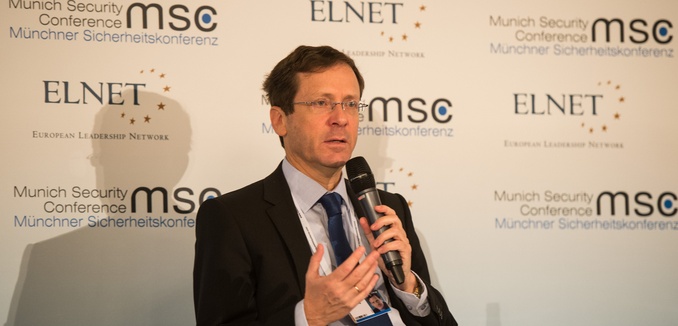Isaac Herzog, head of the Israeli opposition party Zionist Union, told Britain’s ambassador to Israel that the European Union’s plan to label products coming from Israeli settlements is “a prize that Europe is bestowing for terror,” The Times of Israel reported Tuesday.
The EU will decide next week exactly how to label West Bank settlement products, after the European Parliament passed a resolution last month to approve the measure, according to a report by Haaretz.
Herzog, who heads the dovish Zionist Union Knesset faction, told David Quarrey he “strongly opposes this harmful and unnecessary measure,” calling it “a prize that Europe is bestowing for terror.”
“[It] serves only one purpose – continuing the hate and regional conflict. Marking these products is an act of violence by extremists who want to further inflame the situation and the EU is falling into their trap,” he said, according to a Hebrew-language transcript provided by Herzog’s spokesperson.
The Jerusalem Post reported that Deputy Foreign Minister Tzippi Hotovely also slammed the EU’s decision as she toured a West Bank factory yesterday:
Her message, she said, is very simple. “Boycotting products from Judea and Samaria is a boycott against Israel. We do not see any difference between the industrial area of Barkan and the industrial area of Haifa. I came today to show the world what it really looks like, co-existence,” said Hotovely.
She explained that industrial parks in the West Bank where many of the exports to Europe are produced employ both Israelis and Palestinians who work together in the businesses. …
“When you do labeling you harm 10,000 Palestinian families and you do not do anything to the very strong economic system in Israel,” she said.
According to Hotovely, 60% of the workers at the factory she toured were Palestinian, including many in management positions.
The EU is reportedly planning to announce new guidelines for labeling goods produced in Israeli settlements on November 11. The initiative has been in the works since 2012.
In 2013, while examining a controversial decision by the EU to cut off projects with Israeli communities beyond the 1949 armistice line, Northwestern University legal scholar Eugene Kontorovich wrote that the move contradicted EU practice in relation to other communities in occupied territories, particularly in Turkish-occupied Northern Cyprus.
Turkey’s invasion and occupation of Cyprus in 1974 was condemned the UN Security Council, and the EU’s official policy is that the Turkish occupation is illegitimate, and Turkey must completely withdraw. The EU does not recognize the Turkish government in Northern Cyprus.
Nonetheless, the EU maintains an entire separate program to direct funds to Northern Cyprus. … The grants are pursuant to a 2006 regulation adopted by the EU to “end the isolation of the Turkish Cypriot community,” and allocated 259 million euros over five years, and now operates on an annual 28 million euro allocation (a sum that amounts to roughly 0.8 percent of Northern Cyprus[‘s GDP).
Later in 2013, the EU signed a new Fisheries Partnership Agreement with Morocco, which also applied to the Western Sahara. Kontorovich and former Israeli ambassador to Canada Alan Baker characterized the agreement as, “an official double-standard practiced by the EU.” Morocco has been occupying the Western Sahara since 1975.
This past September, after the passing of a non-binding resolution that called on the European Parliament to institute guidelines for the labeling of products from Israeli settlements, Foreign Ministry spokesman Emmanuel Nachshon said, “Europe acts toward Israel with sanctimonious hypocrisy, while it would never consider proposing a similar solution to northern Cyprus or Western Sahara.”
In August, Kontorovich and University of San Diego law professor Avi Bell published (.pdf) a paper challenging the legality of the EU’s labeling initiative and underscoring the double standard to which Israel is held.
There are about 200 territorial sovereignty disputes worldwide, in many cases of which the EU does not accept sovereignty claims of the states which administer the territory in question. Among these territories are Western Sahara (controlled by Morocco), Kashmir (controlled in different parts by India, Pakistan and China), and many others. In many of these areas, the controlling state allows or actively encourages its citizens to live in the territory, in practices that are far more intrusive than those identified by Europe as “settlements” when Israel is involved. Despite the ubiquity of territorial disagreements and settlement practices, the EU has never unilaterally adopted a regulation requiring geographic labelling contrary to the exporting country’s certificate of origination.
[Photo: ELNET Deutchland / Flickr ]




